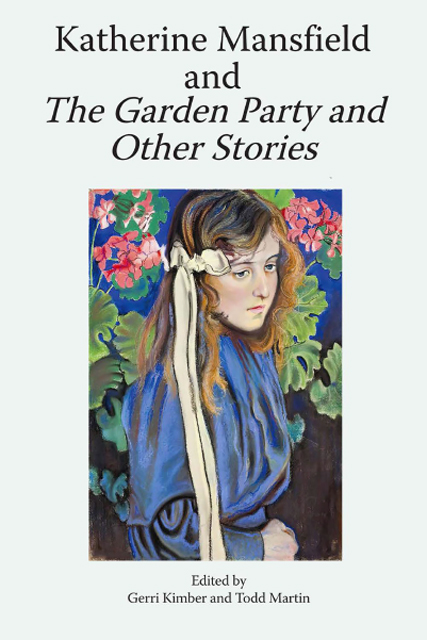Introduction
Published online by Cambridge University Press: 03 June 2023
Summary
The last collection of short stories published in her lifetime, The Garden Party and Other Stories solidified Katherine Mansfield’s place as the most prominent modernist short-story writer. Of course, Mansfield had her critics. As Jeffrey Meyers notes, some of the reviewers of The Garden Party commented on the similarities between it and Bliss and Other Stories, identifying similar themes and character types. In particular, he refers to Malcolm Cowley’s review in the Dial. But while contemporary reviewers provided mixed reactions to the collection, The Garden Party reveals a shifting understanding of the value of what Mansfield was doing in her fiction. While Bliss and Other Stories was often criticised by reviewers as cynical and plotless, similar characteristics were praised in The Garden Party. Rather than critiquing the lack of plot, for example, reviewers often praised the stories for providing a ‘slice of life’ which enhanced her characters. Emphasising the psychological power of the stories, readers praised how she was able to bring her characters to life in a way simple action could not.
Mansfield, however, proved to be among her own worst critics after Bliss was published. According to Antony Alpers, Mansfield felt the contents of the newly published collection ‘were mostly slight or even make-weight stuff’ and ‘she knew that she must either do better very soon or die with her purpose unattained, leaving “scraps” and “bits”’. However, Mansfield’s new drive led to the ‘most productive period she had known since 1917’. Not long after the publication of Bliss, Mansfield wrote ‘The Young Girl’, ‘The Stranger’, ‘The Lady’s Maid’ and ‘The Daughters of the Late Colonel’. She also wrote the often overlooked ‘Poison’, which was rejected by Murry for the Athenaeum and perhaps for this reason was not included in The Garden Party.
The Garden Party contains some of Mansfield’s most sophisticated and well-loved stories, including ‘At the Bay’, ‘The Garden Party’ and ‘The Daughters of the Late Colonel’. However, several of the stories in the collection, which initially appeared in the Sphere, have often been dismissed as inferior, like the ‘make-weight’ stories of Bliss. Alpers argues that the Sphere stories did lasting damage to Mansfield’s reputation.
- Type
- Chapter
- Information
- Publisher: Edinburgh University PressPrint publication year: 2022



